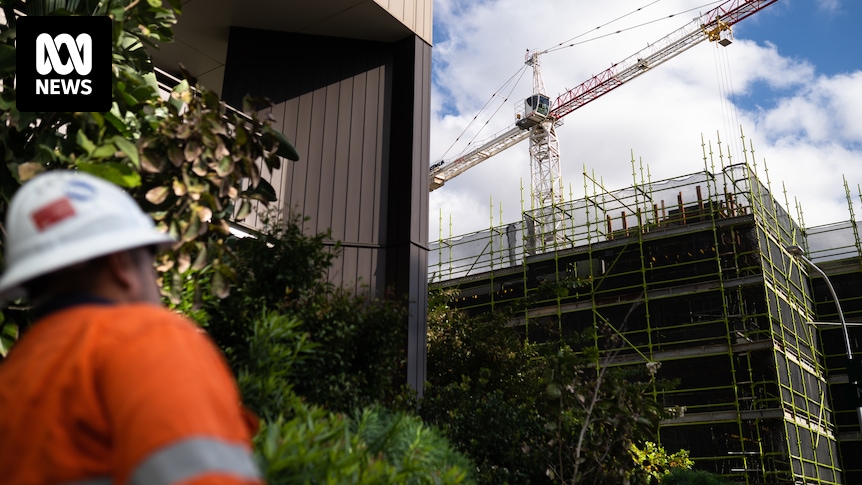With Queensland facing a looming trades shortage, there is an acknowledgement across the industry that apprentices will be needed to meet a growing demand for construction.
But for many small businesses, including Ben Bernard’s Brisbane-based company, putting on an apprentice just is not financially “feasible”.
“We have enough costs incurred in taxes that make it hard enough to run the company,” he said.
“To then try and employ someone who isn’t really much profit for the company for the first two or three years …”
Mr Bernard, who is pictured second from the right, says he likes to pay apprentices above minimum wage. (Supplied)
Mr Bernard said he also liked to pay his apprentices above minimum wage rate.
“Just so it helps them out, and helps them live,” he explained.
“And you don’t have to hear ’em turning up every day telling you how they’re getting paid bugger all.”Pilot covers 7 per cent of apprentices
Mr Bernard is among many in the industry who have cautiously welcomed a $19 million pilot program which would subsidise the wages of 2,000 construction apprentices during their off-site training, agreeing something needed to be done.
But others warned the program, announced by the state government on Thursday, would not be enough.
In 2023, Construction Skills Queensland reported there were more than 30,000 apprentices in the state, meaning Thursday’s announcement would cover about 7 per cent of that number.
Master Plumbers Association chief executive Penny Cornah said the program would, however, help to ease the financial burden on small and family-owned businesses.
Penny Cornah says apprenticeship positions are in high demand. (Supplied)
“It costs an employer over $250,000 for an employee apprentice over a four-year period, and they only receive 2 per cent of that in government incentives,” she said.
She said many apprentices struggled to find an employer who will take on their training, and existing positions were in high demand.
“We had a member recently who put up a job advertisement looking for an apprentice based in south-east Queensland. He had 350 people apply,” she said.
There are about 4,000 plumbing apprentices in training in Queensland, according to Ms Cornah, but she predicted “more than double” that number would be required to meet construction needs.
“We have a huge demand to meet the requirements of the pipeline of work coming through for the Olympic Games and also just general infrastructure projects here in Queensland,” she said.
There is growing demand for trades across Queensland. (ABC News: John Gunn)
Easing burden on small businesses
Under the pilot program, eligible businesses will be able to receive a subsidy of 50 per cent of the typical wage for first- and second-year construction apprentices, and 25 per cent for third- and fourth-year apprentices while they are being trained.
The total payment over four years works out to $10,060 for apprentices aged under 21 and $13,740 for those aged over 21.
Ros Bates announced the pilot program on Thursday. (ABC News: Lucas Hill)
The minister for Finance, Trade, Employment and Training, Ros Bates, said the new program was a response to calls from small businesses.
“The construction industry is the third-largest industry in Queensland and is central to some of our key priorities,” she said.
Warwick Royal, who runs a family-owned plumbing company in Brisbane’s north, agreed the hidden costs in hiring an apprentice could be a burden.
Paying for training costs while apprentices are off-site and the reduced productivity for employees supervising apprentices “all add up”, he said.
“When it comes to the cost to you, you really have to say, ‘Is this worth it?’
“Is it worth me giving opportunity to somebody when it’s going to cost me so much money?”
Mike Roberts says more innovative solutions are needed. (Supplied: Housing Industry Association)
More solutions needed
Mike Roberts from the Housing Industry Association said the pilot program could be an “important piece of the puzzle”.
Queensland facing 54,000 construction worker shortfall ahead of Olympics
He said businesses needed to do their part.
“We’ve been really pushing that message to school leavers that taking on a trade is a very legitimate career path option for them, but the other half of the pie is we need businesses putting their hands up,” he said.
Industry Australia data shows Queensland could face a shortage of more than 50,000 workers as soon as March next year.
With 17 major venues to be built or upgraded before the 2032 Games, and the need for housing increasing, Mr Roberts said Queensland needed to start finding solutions, including attracting interstate and overseas workers.
“When you sit down and look at the numbers it’s a bit of a worry,” he said.
“Growing your own trade base is a medium to long-term solution. We need to find some short-term solutions as well.”

